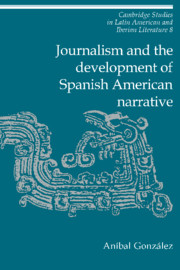Book contents
- Frontmatter
- Contents
- Acknowledgments
- 1 Journalism, modernity, and narrative fiction in Spanish America
- 2 Journalism and (dis)simulation in El Periquillo Sarniento
- 3 Sarmiento and sensationalist journalism: Facundo as crime story
- 4 Journalism versus genealogy: Ricardo Palma's Tradiciones peruanas
- 5 Journalism and the self: the Modernist chronicles
- 6 Journalism and the ethics of writing: Borges, García Márquez, Vargas Llosa, Poniatowska
- Notes
- Bibliography of works cited
- Index
6 - Journalism and the ethics of writing: Borges, García Márquez, Vargas Llosa, Poniatowska
Published online by Cambridge University Press: 08 October 2009
- Frontmatter
- Contents
- Acknowledgments
- 1 Journalism, modernity, and narrative fiction in Spanish America
- 2 Journalism and (dis)simulation in El Periquillo Sarniento
- 3 Sarmiento and sensationalist journalism: Facundo as crime story
- 4 Journalism versus genealogy: Ricardo Palma's Tradiciones peruanas
- 5 Journalism and the self: the Modernist chronicles
- 6 Journalism and the ethics of writing: Borges, García Márquez, Vargas Llosa, Poniatowska
- Notes
- Bibliography of works cited
- Index
Summary
One of the virtues for which I prefer Protestant nations to those of the Catholic tradition is their concern with ethics.
Jorge Luis Borges, prologue to Elogio de la sombra (1969)[T]here is a peculiar and unexpected relation between the affirmation of a universal moral law and storytelling. It would seem that such a law would stand by itself and that its connection either to narration as such or to any particular narrative would be adventitious and superficial at best. Nevertheless … the moral law gives rise by an intrinsic necessity to storytelling, even if that storytelling in one way or another puts into question or subverts the moral law. Ethics and narration cannot be kept separate, though their relation is neither symmetrical nor harmonious.
J. Hillis Miller, The Ethics of Reading (1987), p. 2For nineteenth-century Spanish American narrators, journalistic discourse went from an important auxiliary in their textual struggle for political and social modernization to an oppressive set of rules promoted by the institution of the press, which severely curtailed the writers' desire for greater artistic freedom. Such early-nineteenth-century writers as José Joaquín Fernández de Lizardi, Domingo Faustino Sarmiento, and Ricardo Palma, to mention three major figures, all saw journalistic discourse as an ally in the modernizing projects they variously set forth in such works as El Periquillo Sarniento, Facundo, and Tradiciones peruanas. In contrast the turn-of-the-century modernistas - Martí, Nájera, Darío, Casal, and many others - despite their reliance on journalism to earn a living, felt that journalism as an institution was totally opposed to the ideals of artistic autonomy and authorial dignity for which they strived.
- Type
- Chapter
- Information
- Journalism and the Development of Spanish American Narrative , pp. 101 - 130Publisher: Cambridge University PressPrint publication year: 1993

